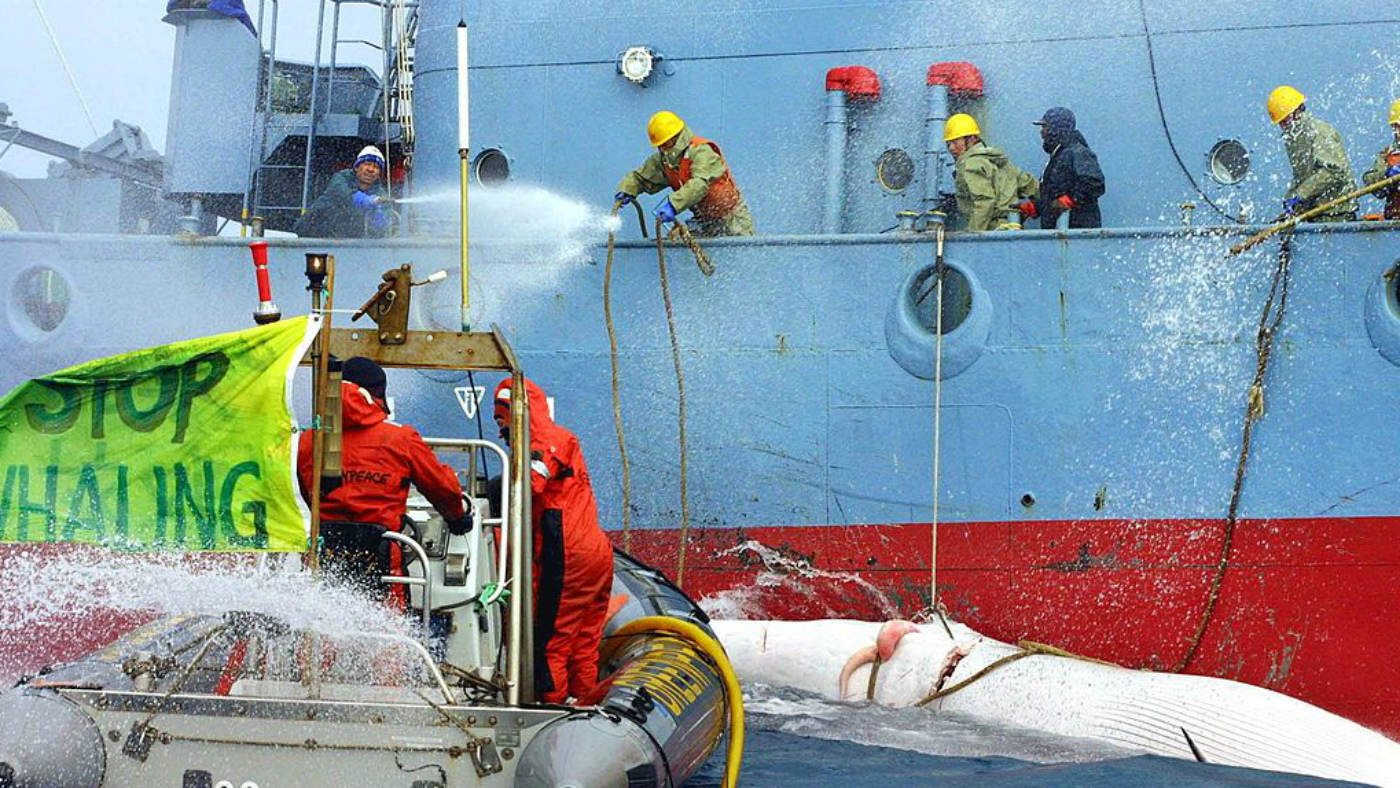Japan kills 300 minke whales in annual hunt
Whaling fleet returns to port after defying global moratorium and international criticism

A free daily email with the biggest news stories of the day – and the best features from TheWeek.com
You are now subscribed
Your newsletter sign-up was successful
Japanese whalers have killed more than 300 minke whales during from their annual Antarctic hunt, defying a worldwide moratorium.
Five ships set sail for the Southern Ocean in November with plans to slaughter the whales, says The Guardian, Three have since returned to Shimonoseki, in the west of Japan, where they were greeted by more than 200 people.
Japan's fisheries ministry said the purpose of the hunt was "research for the purpose of studying the ecological system in the Antarctic Sea".
The Week
Escape your echo chamber. Get the facts behind the news, plus analysis from multiple perspectives.

Sign up for The Week's Free Newsletters
From our morning news briefing to a weekly Good News Newsletter, get the best of The Week delivered directly to your inbox.
From our morning news briefing to a weekly Good News Newsletter, get the best of The Week delivered directly to your inbox.
However, environmental groups and the International Court of Justice (ICJ), which has tried to ban the hunt, say the real goal is to get whale meat for consumption.
Campaign group Humane Society International added: "Each year that Japan persists with its discredited scientific whaling is another year where these wonderful animals are needlessly sacrificed.
"It is an obscene cruelty in the name of science that must end. There is no robust scientific case for slaughtering whales."
Japan is a signatory of the International Whaling Commission, which bans hunting of the mammals, although a loophole in its rules allows them to be killed for scientific research says The Guardian.
A free daily email with the biggest news stories of the day – and the best features from TheWeek.com
A fleet last year also killed more than 300 minke whales.
A report in Australia's News.com,says the country intends to kill 4,000 whales over the next 12 years.
Tokyo argues it is trying to prove the population is large enough to sustain hunting and makes no secret that the meat ends up on dinner tables and in school lunches.
Asian Correspondent says the Japanese see whaling as "part of their national identity" and that any international attack on the practice is "painted as an affront to traditional Japanese customs".
Chris Burgess, of Tsuda Juku University in Tokyo, told the site the issue had been framed as Japan against the west, with the Japanese seeing themselves as "victims of western discrimination, imperialism and 'Japan bashing'".
-
 ‘Those rights don’t exist to protect criminals’
‘Those rights don’t exist to protect criminals’Instant Opinion Opinion, comment and editorials of the day
-
 Key Bangladesh election returns old guard to power
Key Bangladesh election returns old guard to powerSpeed Read The Bangladesh Nationalist Party claimed a decisive victory
-
 Judge blocks Hegseth from punishing Kelly over video
Judge blocks Hegseth from punishing Kelly over videoSpeed Read Defense Secretary Pete Hegseth pushed for the senator to be demoted over a video in which he reminds military officials they should refuse illegal orders
-
 Epstein files topple law CEO, roil UK government
Epstein files topple law CEO, roil UK governmentSpeed Read Peter Mandelson, Britain’s former ambassador to the US, is caught up in the scandal
-
 Iran and US prepare to meet after skirmishes
Iran and US prepare to meet after skirmishesSpeed Read The incident comes amid heightened tensions in the Middle East
-
 Israel retrieves final hostage’s body from Gaza
Israel retrieves final hostage’s body from GazaSpeed Read The 24-year-old police officer was killed during the initial Hamas attack
-
 China’s Xi targets top general in growing purge
China’s Xi targets top general in growing purgeSpeed Read Zhang Youxia is being investigated over ‘grave violations’ of the law
-
 Panama and Canada are negotiating over a crucial copper mine
Panama and Canada are negotiating over a crucial copper mineIn the Spotlight Panama is set to make a final decision on the mine this summer
-
 Why Greenland’s natural resources are nearly impossible to mine
Why Greenland’s natural resources are nearly impossible to mineThe Explainer The country’s natural landscape makes the task extremely difficult
-
 Iran cuts internet as protests escalate
Iran cuts internet as protests escalateSpeed Reada Government buildings across the country have been set on fire
-
 US nabs ‘shadow’ tanker claimed by Russia
US nabs ‘shadow’ tanker claimed by RussiaSpeed Read The ship was one of two vessels seized by the US military